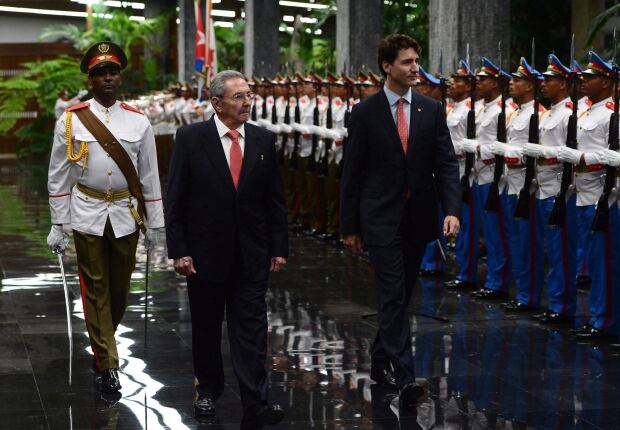At least 5 Canadian diplomats and families hit by mysterious 'sound attacks' in Cuba, source says - Politics - CBC News
At least five Canadian diplomatic families were affected by mysterious "sonic attacks" in Cuba that left them with symptoms including hearing loss, headaches and dizziness.
That is a larger number of people than previously reported and suggests the Canadian diplomats were targeted intentionally and were not merely victims of mistaken identity in a wave of attacks that affected a larger number of U.S. diplomats.
But a Canadian source with knowledge of the affair told CBC News that unlike some of those U.S. diplomats, all affected Canadians have recovered from their initial symptoms, which in some cases required hospital treatment.
The source, speaking on condition of anonymity, said more than five — but fewer than 10 — Canadian families were affected by the attacks.
Staff at the U.S. and Canadian embassies in Havana gradually became aware that something strange was occurring toward the end of last year, when a number of diplomats reported feeling unnatural sensations inside their homes.
In some cases, they heard loud grinding or ringing noises, or felt vibrations in their bodies. Some were in bed when the sensations began. Some reported the sounds and sensations could only be felt in certain parts of the house, and that they could walk in and out of the affected area, feeling the effects shut off as they moved away from it, and resume as they moved back in.
The U.S. State Department has disclosed that some of the 21 U.S. diplomats and family members affected have since been diagnosed with mild traumatic brain injuries affecting speech and memory. Others have suffered permanent hearing loss.
FBI and RCMP investigators have travelled to Cuba, but the investigation has thus far failed to find a culprit, government sources told CBC News.
The Associated Press spoke with current and former U.S. officials who said they are baffled as to what technology could be involved.
"None of this has a reasonable explanation," said Fulton Armstrong, a former CIA official who served in Havana. "It's just mystery after mystery after mystery."
Cubans co-operating
Canadian officials are not ruling out any suspects, but say the Cuban government has been adamant it has no knowledge of the attacks. The Cubans have also been unfailingly co-operative with the investigation, they say.
A senior Canadian diplomat who served in the embassy in Havana said the Cubans have an active and sometimes ruthless intelligence apparatus, and certainly engage in espionage of foreign diplomatic missions. But he said they have no record of targeting diplomats for attacks and generally respect diplomatic conventions.

Canada maintains friendly relations with Cuba. Prime Minister Justin Trudeau met with Cuban President Raul Castro at Revolution Palace in Havana during a visit last November. Cuba has co-operated with the investigation into the attacks and is not thought to be responsible. (Sean Kilpatrick/Canadian Press)
Many Cuba analysts have said the United States also appears to believe the Cubans are innocent of involvement, or at least that the operation may not have been sanctioned at the highest levels.
Although Washington did expel two Cuban diplomats for failing to protect its diplomatic staff as required by the Vienna Convention, experts say the response would have been far harsher if the U.S. believed the Cuban government had targeted and injured U.S. diplomats.
The fact that both U.S. and Canadian diplomats were targeted is suggestive, since Cuba's relationship with the two countries is very different. Moreover, the attacks occurred under the Obama administration during a period in which U.S. relations with the island nation were improving.
Another suspect
Another nation that has often been mentioned in connection with this case is Russia, which has a large diplomatic presence in Cuba, poor relations with both the U.S. and Canada, and an alleged track record of dirty tricks and harassment of foreign diplomats.
The U.S. State Department has accused the Russians of targeting staff at its Moscow Embassy with home break-ins designed to intimidate them, and even the killing of pets.
The recent U.S.-Russian diplomatic relationship has been marked by a pattern of tit-for-tat expulsions and property seizures. In June 2016, a Russian police officer with the Federal Security Service beat a U.S. diplomat trying to enter the U.S. Embassy at night, breaking his shoulder.
The fact the Havana attacks seem to use an unknown (and therefore presumably advanced) technology also lends support to the Russian hypothesis.
But so far, sources told CBC News, investigators remain unable to point the finger of blame at any particular culprit.